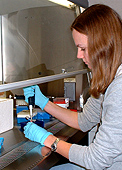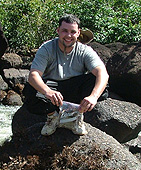Undergraduate Programs
General Information
The program options in the Department of Biological and Environmental Sciences provide students with the background required to succeed in a wide variety of fields such as cell and molecular biology, medicine, environmental science, and education. A core of science courses provides a solid foundation in biology while electives allow students to pursue their special interests. In addition, all biology majors do independent research under the supervision of a faculty mentor during their senior year.
Learning Outcomes
By the completion of their BA degree in biology:
1. Graduates will have a broad understanding of the following core concepts of biology:

- Evolution shapes the diversity of life.
- Structure and function are interrelated at all levels of biological organization.
- Information is stored and exchanged, within and among organisms.
- Life depends on transformations of energy and matter.
- Living systems are interconnected and interacting.
2. Graduates will be able to:
- Apply the process of science.
- Use quantitative reasoning, including statistics, modeling, and simulation.
- Tap into the interdisciplinary nature of science, including communicating and collaborating with other disciplines.
- Clearly convey their understanding of biology through written and oral communication.
- Describe the interrelationship between science and society, including the role of ethics in scientific research
Program Options
For Biology majors, the Professional Option prepares students planning to move on to graduate or professional school (e.g. medical school), or who plan to work in an entry-level biology position (e.g. research technician).
The Bioscience Option is for students who do not have immediate plans to continue further biological education, but who still want a general biology background.
The Ecology Option prepares students for graduate school and/or careers in ecology and environmental science.
Students looking to careers as an elementary or secondary school teacher, with a background in biological sciences, should contact the Dept. of Education.
Students can earn a Minor in Biology by passing 18 or more credit hours in select department courses .
All degree program options require the completion of required courses, general education requirements, and additional free electives to total a minimum of 122 semester hours, including physical education and foreign language. Students should contact their academic advisor about meeting these requirements. Downloadable program option planning sheets may be found at the Forms webpage. Descriptions of undergraduate biology courses are available at the online Undergraduate Catalog.



